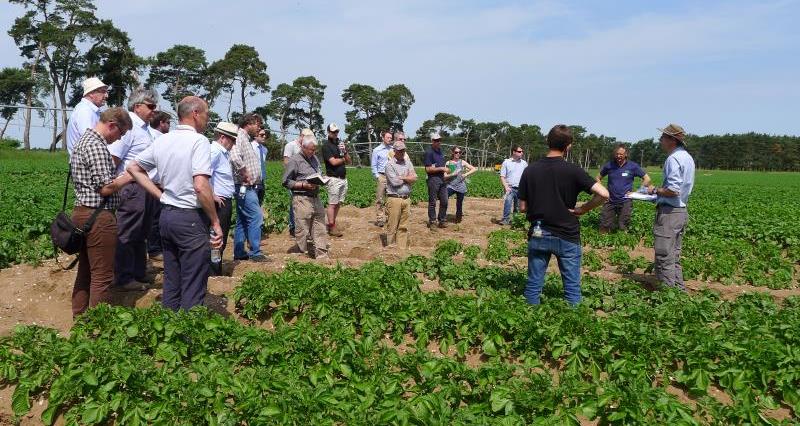In brief...
Visitors to the new AHDB Strategic Potato (SPot) farm in the Suffolk Brecklands can learn about the optimum timing of irrigation to control common scab, the efficient use of water, and the contrasting levels of varietal susceptibility to drought, pests and infection....
The Elveden Estate in Suffolk has opened its doors as the second of AHDB’s Strategic Potato (SPot) Farms.
With the need for growers to improve agronomic performance through more efficient water use steadily climbing the sustainability agenda, visitors to Elveden will find plenty of food for thought on how to improve their water performance.
The SPot project, coordinated by AHDB Potatoes, gives growers the chance to inspect and discuss a range of crop trials which compare different factors across a range of commercial potato varieties.
Not surprisingly in view of local Breckland light and sandy soils, the key resource at Elveden is water, and some of the trial and demonstration plots are designed to explore ways to reduce water consumption to improve water resilience, reduce costs and minimise the environmental impact of irrigation.
Paul Hammett, NFU national water resources specialist, believes that whilst securing extra water supplies will become increasingly important for growers in the future, we must not ignore the other side of the equation – how to manage our demand for water.
One of the trials at Elveden explores the optimal use of water to control common scab, an infection which devalues potato crops, particularly where skin appearance is important.
Dr Mark Stalham, from NIAB Cambridge University Farm, explained that many growers assume that tubers are susceptible to invasion from the organism which causes common scab as soon as they form. But recent research has shown that the organism is not found in the tuber in the first few weeks of its life.
The crucial period for irrigation is between week one and week three after tuber initiation, and so the Elveden field trial seeks to achieve smarter water use by delaying irrigation until the pathogens develop.
Andrew Francis, senior farms manager at Elveden, is happy to host the trials which he believes will offer practical solutions to regulatory pressures faced by growers.
“The scab trial is about optimising water use and trying to understand where the fail point is”, said Andrew.
“Water timing is critical to within a 24-hour period for our soils and our varieties, and with a lot of pressure in the catchment to reduce water, we need to demonstrate how tolerant different varieties are, and where we reach that drop-off point.”
In other demonstration plots at Elveden, soil probes are used to assess the depth of moisture, while trials are under way to assess the impact of over-watering and find situations where less irrigation might be needed.
Dr Phil Burgess, Head of Knowledge Exchange at AHDB Potatoes, put the potential for water savings resulting from the Elveden trials in context when he said:
“At an estate the size of Elveden, if you could save half an inch of water on every acre, it has a huge impact on the total water resources that are available”.
